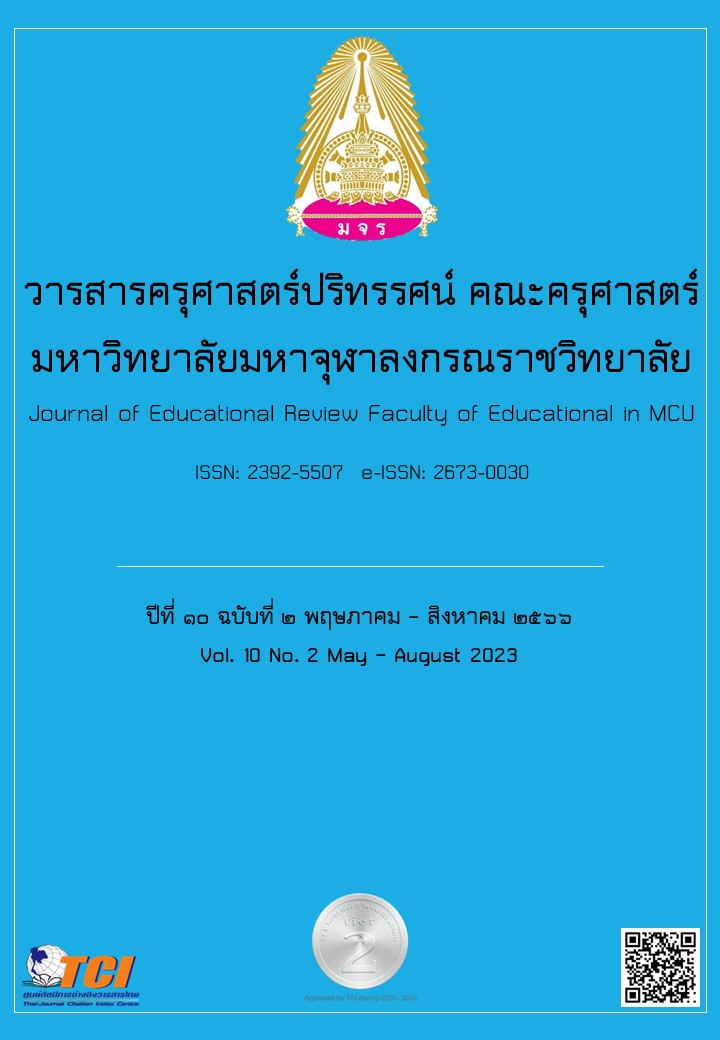A COMPARATIVE STUDY OF GRADES 6 TO 9 STUDENTS’ ATTITUDES TOWARD THAI LANGUAGE ACQUISITION CLASS AND THAI LANGUAGE LITERATURE CLASS AT A TRILINGUAL SCHOOL IN THAILAND
Main Article Content
Abstract
This study aimed to determine whether there was a significant difference, within and among grades, in Grades 6 to 9 students’ attitudes toward Thai Language Acquisition and Thai Language Literature classes at a trilingual school in Thailand. A conveniently chosen sample of 239 students, enrolled in the target school during the academic year 2021-2022, participated in this study. For the data collection, the Attitudes Toward Thai Language Acquisition Class Questionnaire, and the Attitudes Toward Thai Language and Literature Class Questionnaire, adopted from two subscales from Gardner’s (2010) Attitude/Motivation Test Battery (AMTB), were used. From performing the descriptive statistics on the collected data, it was found that the levels of attitudes toward Thai Language Acquisition class for Grades 6 and 7 students were partially positive, and partially negative for Grades 8 and 9 students. Moreover, it was found that the levels of attitudes toward Thai Language Literature class for Grades 6 and 7 students were positive, and partially positive for Grades 8 and 9 students. From conducting a statistical comparative analysis, it was found a significant difference between participants’ attitudes toward Thai Language Acquisition class and Thai Language Literature class for Grade 7 and Grade 8 students, with the mean scores difference favoring the latter class numerically. Moreover, the attitudes toward Thai Language Acquisition class were significantly more positive in Grade 6 students than in Grade 7, and Grade 8 at a trilingual school in Thailand, while the attitudes toward Thai Language Literature class were found to be significantly more positive in Grades 6 and 7 students than in Grade 9 students. Based on the research findings, recommendations for students, teachers, administrators, and future researchers are provided.
Article Details

This work is licensed under a Creative Commons Attribution-NonCommercial-NoDerivatives 4.0 International License.
ทัศนะและความคิดเห็นที่ปรากฏในบทความในวารสารฉบับนี้ถือเป็นความรับผิดชอบของผู้เขียนบทความนั้นเพียงผู้เดียว และไม่ถือเป็นทัศนะและความรับผิดชอบของกองบรรณาธิการ
กองบรรณาธิการขอสงวนสิทธิ์ในการคัดเลือกบทความลงตีพิมพ์และจะแจ้งให้เจ้าของบทความทราบหลังจากผู้ประเมินบทความตรวจอ่านบทความแล้ว
ต้นฉบับที่ได้รับการตีพิมพ์ในวารสารครุศาสตร์ปริทรรศน์ คณะครุศาสตร์ มหาวิทยาลัยมหาจุฬาลงกรณราชวิทยาลัย ถือเป็นกรรมสิทธิ์ของคณะครุศาสตร์ มหาวิทยาลัยมหาจุฬาลงกรณราชวิทยาลัย ห้ามนำข้อความทั้งหมดหรือบางส่วนไปพิมพ์ซ้ำ เว้นเสียแต่ว่าจะได้รับอนุญาตจากมหาวิทยาลัยฯ เป็นลายลักษณ์อักษร
References
Atay, D. & Kurt, G. (2010). The socio-educational model of second language: the Turkish context. Procedia Social and Behavioral Sciences. 2(2). 3089-3093.
Becker, J. M. (2013). Attitudes towards mother tongue education in Uganda: You try to make sure that our children remain backward. 5th European Conference on African Studies: African Dynamics in a Multipolar World. Lisbon, Portugal.
Cahapay, M. B. (2020). Attitudes toward mother tongue and academic performance: evidence from monolingual context in the Southern Philippines. International Journal of Language Teaching and Education. 4(1). 1-8.
Charoensuk, C. (2010). Factors affecting on Thai language reading skill of the second level, Primary Grades 4–6 students at Watchaichanasongkarm School in Samphantawong District, Bangkok. Unpublished master’s thesis. Srinakharinwirot University.
Cocca, M., Garcia, J. A. P., Zamarripa, J. I., Demetriou, Y., & Cocca, A. (2017). Psychometric parameters of the attitude/motivation test battery in a Mexican environment. Journal of Sports Psychology. 26. 149–155.
Dagnew, A. (2017). The relationship between students’ attitudes towards school, values of education, achievement motivation and academic achievement in Gondar secondary schools, Ethiopia. Research in Pedagogy. 7(2). 30–42.
Das, S. K., Halder, U. K., Mishra, B., & Debnath, D. (2014). Study on relationship between attitude towards education and academic achievement in secondary level minority student. Indian Streams Research Journal. 4(10). 1–6.
Gardner, R. C. (1985). Social psychology and second language learning: The role of attitude and motivation. Edward Arnold.
Gardner, R. C. (2005, May 30). Integrative motivation and second language acquisition. [Plenary talk]. Canadian Association of Applied Linguistics/Canadian Linguistics Association Joint Plenary Talk, London, Canada.
Gardner, R. C. (2010). Motivation and second language acquisition: The socio-educational model (Language as social action). Peter Lang.
International Baccalaureate Organization. (2005). Language learning in MYP. International Baccalaureate Organization.
International Baccalaureate Organization. (2014). Language and literature guide. for use from September 2014/January 2015. International Baccalaureate Organization.
International Baccalaureate Organization. (2020). Language acquisition guide. for use from September 2020/January 2021. International Baccalaureate Organization.
International Baccalaureate Organization. (2020). Approaches to learning. International Baccalaureate Organization.
International School Association of Thailand. (2014). Education systems. From https://www.isat.or.th/education-systems Retrieved November 22, 2021.
Kohren, T., Pimsan, N., & Tanawutpornpinit, S. (2020). The learning management model of curriculum for Thai language, Thai culture, and Thai history in international secondary schools. Journal of Educational Review Faculty of Educational in MCU. 7(2). 240–254.
Nakasonth, P. (1997). The development of kindergarten Thai language and culture curriculum for Thai children in international schools. Unpublished master’s thesis. Chulalongkorn University.
Neev Academy. (2020). The Middle Years Programme (MYP) Curriculum Handbook 2020–2021. From https://neevacademy.org/images/pdf/myp_handbook.pdf Retrieved May 1, 2022.
Office of Private Education Commission. (2021). Announcement of the Office of Private Education Commission: Guide to international school formal education allowance. From https://opec.go.th/wp-content/uploads/2020/10/scan0010-3.pdf Retrieved November 26, 2021.
Office of Public Education and Commission. (2020). Thai language, Thai culture, and Thai history for international schools. Office of Private Education Commission.
Office of the Basic Education Commission. (2008). The Basic Education Core Curriculum. From http://academic.obec.go.th/images/document/1525235513_d_1.pdf Retrieved November 22, 2021.
Rumakom, W. (2018). Thai language learning strategies and attitudes towards Thai language of the Thai Muslim bachelor’s degree students in Pathumthani Province. Ramkhamhaeng Research Journal of Humanities and Social Sciences. 21(2). 36–49.
Sithdichoke, R. (1989). The relationship between attitude towards Thai subject and achievement in learning Thai subject of students in the colleges of physical education. Chulalongkorn University Press.
Syukur, A. (2016). Encouraging students to have positive attitudes toward learning English. Ethical Lingua. 3(2). 122–130.
Tongkumnerd, N. (2017). Construction of Thai reading skills exercise for Prathomsuksa 3 students of Khaochamao District, Rayong Province. Journal of Education Naresuan University. 19(1). 1–105.
Vargas-Sánchez, A., Plaza-Mejía, M.Á., & Porras-Bueno, N. (2016). Attitude. In J. Jafari, & H. Xiao Eds.. Encyclopedia of tourism. Springer.


